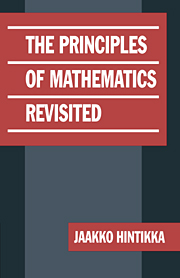Book contents
- Frontmatter
- Contents
- Introduction
- 1 The functions of logic and the problem of truth definition
- 2 The game of logic
- 3 Frege's fallacy foiled: Independence-friendly logic
- 4 The joys of independence: Some uses of IF logic
- 5 The complexities of completeness
- 6 Who's afraid of Alfred Tarski? Truth definitions for IF first-order languages
- 7 The liar belied: Negation in IF logic
- 8 Axiomatic set theory: Fraenkelstein's monster?
- 9 IF logic as a framework for mathematical theorizing
- 10 Constructivism reconstructed
- 11 The epistemology of mathematical objects
- Appendix (by Gabriel Sandu)
- References
- Index of names
- Index of subjects and titles
9 - IF logic as a framework for mathematical theorizing
Published online by Cambridge University Press: 15 December 2009
- Frontmatter
- Contents
- Introduction
- 1 The functions of logic and the problem of truth definition
- 2 The game of logic
- 3 Frege's fallacy foiled: Independence-friendly logic
- 4 The joys of independence: Some uses of IF logic
- 5 The complexities of completeness
- 6 Who's afraid of Alfred Tarski? Truth definitions for IF first-order languages
- 7 The liar belied: Negation in IF logic
- 8 Axiomatic set theory: Fraenkelstein's monster?
- 9 IF logic as a framework for mathematical theorizing
- 10 Constructivism reconstructed
- 11 The epistemology of mathematical objects
- Appendix (by Gabriel Sandu)
- References
- Index of names
- Index of subjects and titles
Summary
In earlier chapters, especially in Chapters 3, 4, and 7, IF first-order logic was introduced and its mathematical properties were briefly studied. The crucially important question here is, nevertheless, not what mathematics can do for your logic, but what your logic can do for mathematics. What can logic – any logic – in principle do in and for mathematics?
Here we are in the proximity of some of the main traditional, not to say nostalgic, issues in the foundations of mathematics. For one thing, the logicist philosophers used to have a simple answer to the question just posed. Their answer was: Everything. Or, as it also used to be put: Mathematics can be reduced to logic. Unfortunately, the nostalgia of this answer is not what it was in the good old days. It was then thought that “the logic” could be formulated as an axiom system on the same level as different mathematical axiom systems, so that the purported reduction could be discussed as a reduction of one axiomatic system to another.
What has been found in this book shows the hopelessness of such thinking. Not only is a complete axiomatization impossible for the basic part of logic, IF first-order logic but even when there exists an axiomatization of some part of logic, it is an axiomatization in a radically different sense from axiom systems for nonlogical theories. This disparity makes it nonsensical to speak of a reduction of a nonlogical axiom system to a logical one.
- Type
- Chapter
- Information
- The Principles of Mathematics Revisited , pp. 183 - 210Publisher: Cambridge University PressPrint publication year: 1996



